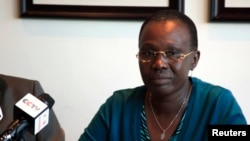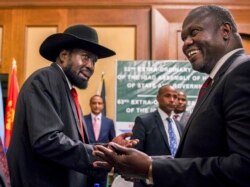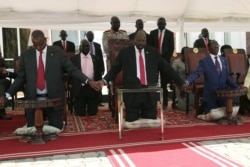A top South Sudanese opposition official says a unified military force will not be in place by February 22, the deadline for the country's rival parties to form a transitional unity government.
Angelina Teny, who chairs the South Sudan Strategic Defense and Security Review Board, says the parties need six more weeks for a unified force.
Uniting the government and opposition forces into one army is a key provision of the peace agreement that President Salva Kiir and rebel leader Riek Machar signed in Addis Ababa in 2018. Failure to merge the sides has been a stumbling block in efforts to create the unity government called for in the deal.
Teny says while some security arrangements of the revitalized peace agreement have been implemented, much more needs to be done.
“Now there is transport and movement of combatants or forces to training centers from cantonment [sites] and from barracks. These people are now in training centers," Teny told VOA's South Sudan in Focus.
"Even though the forces are in the training centers, the training has not commenced yet. In order to orient them and unify them properly, it is supposed to be delivered in eight weeks, so the training will take eight weeks and the screening will probably take another week or two," Teny said.
Teny also says implementing the security arrangements is proving to be very expensive and will require outside support.
“We understand the concerns and anxiety of the donors and the funders given the nature of corruption in this country and the fear for misuse of resources. We had donors who have given in-kind support but the agreement is going to need more than in-kind support," said Teny.
The peace deal states that the government and the opposition, known as the Sudan People's Liberation Movement-in-Opposition, shall form a unified force consisting of about 83,000 soldiers and other personnel.
The deadline to form the unity government has been postponed twice by the parties due to a number of challenges, including no resolution over the number of states and their boundaries, along with security arrangements.
On Tuesday, President Kiir met with South Sudan's s 32 state governors and told them “to prepare for any eventualities” according to a Juba-based newspaper, The Dawn. Observers say that statement suggests Kiir wants to resolve the long-standing dispute over the number of states and their boundaries before the February deadline.
Teny says the unity government could still be formed this month if the Kiir administration compromises on the number of states and accepts some of the opposition’s proposals.
“I don’t see how a government can be formed... without some of these critical aspects. Maybe he [Kiir] has something under his sleeves with regards to the number of states that will be really welcomed,” Teny told VOA.
Attempts by South Africa’s envoy to South Sudan and Deputy President David Mabuza to refer the stalemate over the states to arbitration was rejected by some of the opposition parties, who say that would only be viable if an arbitration committee finalizes its findings before the 22nd.
The SPLM-IO also proposed the demilitarization of Juba and a deployment of a third party force to safeguard some towns in the event that the military training is not completed on time. That idea was not adopted by the parties.
Kiir and SPLM-IO leader Machar are expected to meet in Addis Ababa over the weekend to try to break the deadlock on the number of states and their boundaries.






